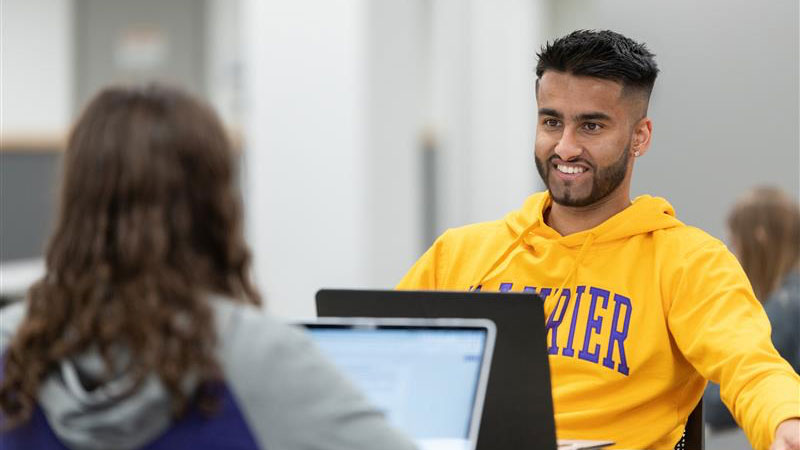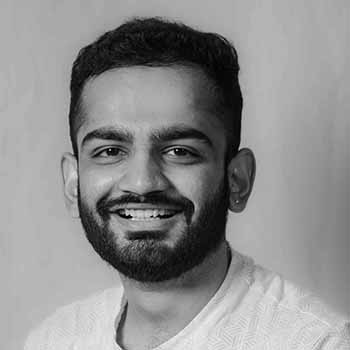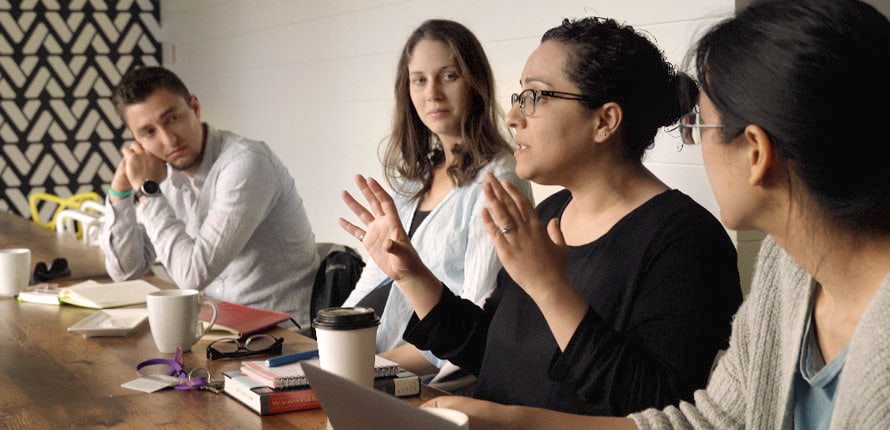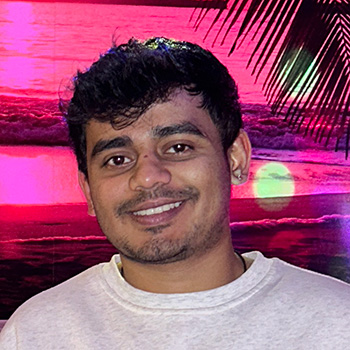Search for academic programs, residence, tours and events and more.
Co‑op
Ready to shape the future of technology? The Master of Applied Computing (MAC) offers an education on the cutting edge. This advanced computing degree adapts to the ever-changing technological landscape through a theoretical, practical and in-demand program focused on mobile, enterprise, data mining and machine learning. Learn from faculty with expertise in algorithms, symbolic computation, embedded systems, networking, image processing, system-on-a-chip, security and quantum computing. The MAC program helps you stand out in the job market and shows employers you have the advanced technical knowledge and skills to create technological solutions.
The full-time coursework option is offered at the Brantford campus. You can also choose a part-time or online coursework option to fit your schedule. Thesis and co-op options are available at the Waterloo campus.

Learn theory and practice from expert faculty members.
Choose from full-time or part-time program options.
Study near a network of industry leading employers.
Our philosophy is to create a “dream it, build it” environment where you apply the theory gained in the classroom and apply it to coursework projects or in the field through a co-op placement. Employers note that graduates of traditional master's degrees in computing or computer science have a high level of technical knowledge but may have less practical knowledge or experience. This program stands out as we equip you with both. Using case studies, project-based courses and cooperative education opportunities, the MAC program will give you practical skills in ways that theory-only degrees cannot.
Each program option offers a variety of courses and options to complete your MAC degree. And with the choice to study in Brantford, Waterloo or online, you’re sure to find the option that works best for your academic preferences and overall lifestyle.
Full-time Coursework Option
In the full-time coursework option, you will complete nine courses. It is anticipated that it will take four terms (16 months) to complete this degree.
Required courses include:
A description of each course can be found on the MAC course offerings list.
Part-time Coursework Option
In the part-time coursework option, you will complete nine courses. It is anticipated it will take five to nine terms (20 to 36 months) to complete this degree.
Required courses include:
A description of each required course can be found on the MAC course offerings list.
With the approval of the graduate coordinator and the AVP/dean of the Faculty of Graduate and Postdoctoral Studies, you may choose some of your electives from courses offered in other master’s programs at Laurier. These decisions will be made on a case-by-case basis by the graduate coordinator.
In the full-time thesis option, you will complete four courses along with your thesis. It is anticipated that it will take five terms (20 months) to complete this degree.
Required courses include:
A description of each required course can be found on the MAC course offerings list.
In the full-time co-op option, you will complete seven courses as well as a paid co-op placement in terms three and four. It is anticipated that it will take five terms (20 months) to complete this degree.
After completing two terms of coursework, you will complete your co-op placement. After your co-op placement, you will return for one final academic term to complete your capstone project.
Required courses include:
A description of each required course can be found on the MAC course offerings list.
In the part-time coursework option, you will complete nine courses. It is anticipated you will take one to two courses per term and take five to nine terms (20 to 36 months) to complete the degree.
Required courses include:
A description of each required course can be found on the MAC course offerings list..
With the approval of the graduate coordinator and the AVP/dean of the Faculty of Graduate and Postdoctoral Studies, you may choose some of your electives from courses offered in other master’s programs at Laurier. You can also be considered for CP680: Capstone Project if you are interested. These decisions will be made on a case-by-case basis by the graduate coordinator.
To be as flexible as possible, in-person exams can be written at Laurier’s Brantford, Milton or Waterloo campuses. If you are located more than 100 kilometres from a Laurier campus, you can arrange for an in-person proctor close to your location. More details can be found here.
As you consider the next steps in your education, we want to support you along the way. Our emails have the updates, insights and information you need to make the decision that's best for you.
Take the first step in your graduate education and apply to one of our graduate program options. Follow our three-step admission process – we'll walk you through how to apply and prepare you for your first day as a graduate student.
Applications are assessed until the application deadline or until the program is full. Admission assessments begin as soon as a complete application is received so you are encouraged to apply early. Only complete applications (which includes the OUAC application and all required documents) will be assessed.
Additional Thesis Option Requirements
To increase your chance of acceptance, identify a thesis supervisor before applying. You can review the theses of previous Laurier MAC students to help guide your choice.
Additional Co-op Option Requirements
Students interested in completing a co-op placement must apply for the co-op option. There is no option to switch to the co-op stream after admission.
After you have submitted your OUAC application, paid the non-refundable application fee, and Laurier has received your application, you'll receive an email from gradadmissions@wlu.ca advising you to upload the additional required documentation to your applicant portal.
An application for admission to our Master of Applied Computing coursework program must include:
Visit our Graduate Admissions Toolkit for more information about applying.
Tuition Deposits
As an international applicant, a tuition deposit is required after you have accepted your offer of admission to the MAC program. Please do not pay your tuition deposit until you have accepted your offer.
Study Permits
If you have questions about the study permit application process, including questions about the updated financial requirements, you can connect with an International Student Advisor for a 1-on-1 meeting. You can also register to attend a monthly study permit application webinar.
After you have submitted your OUAC application, paid the non-refundable application fee, and Laurier has received your application, you'll receive an email from gradadmissions@wlu.ca advising you to upload the additional required documentation to Laurier’s Online Registration and Information System (LORIS).
An application for admission to our Master of Applied Computing co-op or thesis program must include:
Visit our Graduate Admissions Toolkit for more information about applying.
Tuition Deposits
As an international applicant, a tuition deposit is required after you have accepted your offer of admission to the MAC program. Once you pay your tuition deposit, we will request a provincial attestation letter (PAL) on your behalf. Please do not pay your tuition deposit until you have accepted your offer.
Applications are assessed until the application deadline or until the program is full. Admission assessments begin as soon as a complete application is received so you are encouraged to apply early. Only complete applications (which includes the OUAC application and all required documents) will be assessed.
| Entry Term | Application Opens | Application Deadline |
|---|---|---|
| Spring (May 2026) Start | January 2025 | November 15, 2025 |
| Fall (September 2026) Start | October 2025 | April 13, 2026 |
| Winter (January 2027) Start | January 2026 | August 14, 2026 |
| Spring (May 2027) Start | January 2026 | December 15, 2026 |
| Option | Entry Term | Application Opens | International Application Deadline | Domestic Application Deadline |
|---|---|---|---|---|
| Thesis | Fall (September) | July 1 | Jan. 31 | March 15 |
| Coop | Fall (September) | July 1 | Jan. 15 | Jan. 15 |
Proficiency in written and spoken English is essential to graduate studies at Laurier. Applicants whose language of instruction during their previous postsecondary education was not English must submit evidence of proficiency in English.
Students applying to the coursework option who need to submit proof of English proficiency can submit their test scores through their applicant portal.
Students applying to the thesis or co-op options who need to submit proof of English proficiency can submit their test scores through LORIS.
Questions? Contact MACadvising@wlu.ca.

“The best part of the program is studying the trends: machine learning, AI, importance of data and all the latest technologies.”
Aryan Mehulkumar Patel, current MAC student
Regardless of the type of graduate degree program you intend to pursue, financial planning is important. At Laurier, we want to provide you with as much information as possible about a variety of scholarship and funding opportunities and equip you with the skills to manage your finances effectively in the years to come.


“The faculty are very helpful in all ways possible. You get a clear understanding and build more knowledge in the courses they teach.”
Niken Patel, current MAC student
This program can lead to careers such as:
ASPIRE is with you every step of the way – from before you arrive on campus to graduation – with dedicated grad student support for community building, wellness education, skills development, and career success.
Learn about the interests of our faculty members. If you are looking for more information about this program, have questions, or want to set up a meeting, contact a member of our team.
Shimaa Abdelmeguid
Assistant Professor
Saiqa Aleem
Assistant Professor
Azam Asilian Bidgoli
Assistant Professor
Bernard Chiu
Associate Professor, Graduate Coordinator (Waterloo)
Mustafa Daraghmeh
Assistant Professor
Dariush Ebrahimi
Assistant Professor
Somayeh Fatahi
Assistant Professor
Hongbing Fan
Associate Professor
Lilatul Ferdouse
Assistant Professor
Angèle Foley
Professor
Leo Gao
Assistant Professor
Shohini Ghose
Professor
Director, Centre for Women in Science (WinS)
Chính Hoàng
Professor
Alexei Kaltchenko
Associate Professor
Asif Khan
Assistant Professor
Ilias Kotsireas
Professor
Director of the CARGO lab
Kaiyu Li
Assistant Professor
Yang Liu
Associate Professor
Abdul-Rahman Mawlood-Yunis
Assistant Professor
Usama Mir
Assistant Professor, Graduate Coordinator (Brantford)
Emad Mohammed
Assistant Professor
Samuel Okegbile
Assistant Professor
Sukhjit Singh Sehra
Assistant Professor
Marek Wartak
Professor
Li Wei
Professor
Jessie Zhao
Assistant Professor
Eugene Zima
Associate Professor
Think this is the perfect program to continue your education?